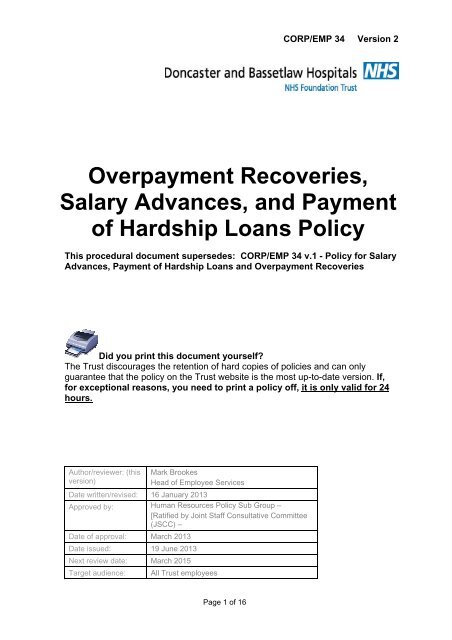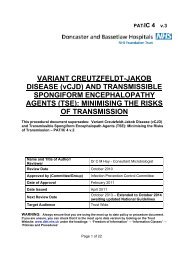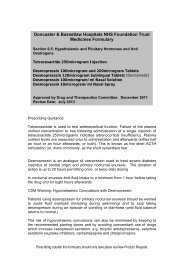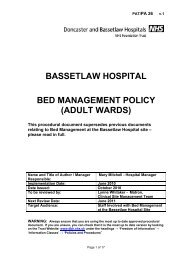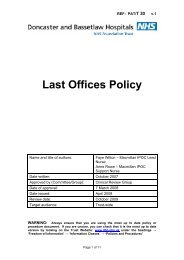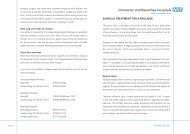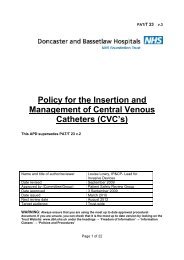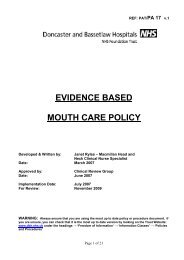CORP/EMP 34 v.2 - Doncaster and Bassetlaw Hospitals NHS ...
CORP/EMP 34 v.2 - Doncaster and Bassetlaw Hospitals NHS ...
CORP/EMP 34 v.2 - Doncaster and Bassetlaw Hospitals NHS ...
You also want an ePaper? Increase the reach of your titles
YUMPU automatically turns print PDFs into web optimized ePapers that Google loves.
<strong>CORP</strong>/<strong>EMP</strong> <strong>34</strong> Version 2<br />
Overpayment Recoveries,<br />
Salary Advances, <strong>and</strong> Payment<br />
of Hardship Loans Policy<br />
This procedural document supersedes: <strong>CORP</strong>/<strong>EMP</strong> <strong>34</strong> v.1 - Policy for Salary<br />
Advances, Payment of Hardship Loans <strong>and</strong> Overpayment Recoveries<br />
Did you print this document yourself?<br />
The Trust discourages the retention of hard copies of policies <strong>and</strong> can only<br />
guarantee that the policy on the Trust website is the most up-to-date version. If,<br />
for exceptional reasons, you need to print a policy off, it is only valid for 24<br />
hours.<br />
Author/reviewer: (this<br />
version)<br />
Mark Brookes<br />
Head of Employee Services<br />
Date written/revised: 16 January 2013<br />
Approved by: Human Resources Policy Sub Group –<br />
[Ratified by Joint Staff Consultative Committee<br />
(JSCC) –<br />
Date of approval: March 2013<br />
Date issued: 19 June 2013<br />
Next review date: March 2015<br />
Target audience:<br />
All Trust employees<br />
Page 1 of 16
<strong>CORP</strong>/<strong>EMP</strong> <strong>34</strong> Version 2<br />
Amendment Form<br />
Version Date Brief Summary of Changes Author<br />
Version 2 16 Jan 2013 • Policy name change from “Policy for Salary<br />
Advances, Payment of Hardship Loans <strong>and</strong><br />
Overpayment Recoveries” to “Overpayment<br />
Recoveries, Salary Advances, <strong>and</strong> Payment of<br />
Hardship Loans Policy.<br />
• Order amended from <strong>34</strong> v.1 due to policy name<br />
change.<br />
• All references to Pay Services amended to<br />
Employee Services.<br />
• Section 1.2 Responsibilities moved to section 3.<br />
• “Purpose” sections 2.1; 3.1 <strong>and</strong> 4.1 moved to<br />
section 2.<br />
• Salary advances moved to section 6.<br />
• Para 3.3 in <strong>34</strong> v.1 - removed – exceptions to<br />
hardship loan repayment period.<br />
• Hardship Loans moved to section 7.<br />
• Section 8 - Monitoring Compliance added.<br />
• Section 9 - Definitions added.<br />
• Section 10 - Equality Impact Assessment added.<br />
• Section 11 – Associated Trust Procedural<br />
Documents.<br />
• Section 2.3 - paragraph added stating that<br />
employee must exhaust other opportunities to fund<br />
the hardship before requesting money from the<br />
Trust.<br />
• Appendix A – Request for an advance form moved<br />
to Appendix E <strong>and</strong> updated.<br />
• All other Appendix letters updated.<br />
• Added Appendix F request for a hardship loan<br />
application form.<br />
Mark Brookes<br />
Page 2 of 16
<strong>CORP</strong>/<strong>EMP</strong> <strong>34</strong> Version 2<br />
Contents<br />
Page<br />
Section<br />
No.<br />
1 Introduction 4<br />
2 Purpose 5<br />
3 Duties <strong>and</strong> Responsibilities 6<br />
4 Overpayments Procedure 7<br />
5 Overpayment Recovery Process 7<br />
6 Salary Advance Process 8<br />
7 Process Requesting a Hardship Loan 9<br />
8 Monitoring Compliance with the Procedural Document 9<br />
9 Definitions 9<br />
10 Equality Impact Assessment 9<br />
11 Associated Trust Procedural Documents 10<br />
Appendices<br />
Appendix A 1 st Overpayment letter 11<br />
Appendix B Confirmation of Meeting outcome 12<br />
Appendix C 2 nd Overpayment letter 13<br />
Appendix D Leaver Overpayment letter 14<br />
Appendix E Request for an Advance of Salary 15<br />
Appendix F Request for Hardship Loan 16<br />
Page 3 of 16
<strong>CORP</strong>/<strong>EMP</strong> <strong>34</strong> Version 2<br />
1. INTRODUCTION<br />
1.1 Background<br />
There may be occasions when staff are underpaid due to non-receipt of<br />
transactional information, or may require financial assistance, which is not related<br />
to failure in Trust operational issues.<br />
Similarly, overpayments may occur from time to time due to a process failure<br />
resulting in an ESR transaction being applied either incorrectly or retrospectively<br />
which results in an overpayment occurring. Typical examples include late leaver or<br />
decrease in hour’s notifications.<br />
1.2 Overpayments - Legislative <strong>and</strong> Trust Overview<br />
Section 13 of the Employments Rights Act 1996, states:<br />
Right not to suffer unauthorised deductions<br />
(1) An employer shall not make a deduction from wages of a worker employed by<br />
him unless—<br />
(a) the deduction is required or authorised to be made by virtue of a statutory<br />
provision or a relevant provision of the worker’s contract, or<br />
(b) the worker has previously signified in writing his agreement or consent to the<br />
making of the deduction.<br />
However it further states in section 14 that:<br />
Section 13 does not apply to a deduction from a worker’s wages made by his<br />
employer where the purpose of the deduction is the reimbursement of the<br />
employer in respect of—<br />
(a) an overpayment of wages, or<br />
(b) an overpayment in respect of expenses incurred by the worker in carrying out<br />
his employment.<br />
The Trust therefore has the right to recover any salary overpayment from an<br />
employee irrespective of how it occurred. However, the Trust will always attempt<br />
to notify the employee when an overpayment has been made <strong>and</strong> agreed how the<br />
money should be repaid before repayment commences.<br />
1.3 Salary Advances<br />
When an employee has been underpaid part, or all of their salary through no fault<br />
of their own, they can be entitled to request a salary advance to cover the shortfall.<br />
An advance would normally only be approved where, not to do so, would cause<br />
the employee undue financial distress.<br />
Page 4 of 16
<strong>CORP</strong>/<strong>EMP</strong> <strong>34</strong> Version 2<br />
1.4 Hardship Loans<br />
Hardship loans are discretionary loans paid against a member of staff’s future<br />
salary. Only existing staff may request monies from the Trust for personal reasons<br />
due to financial difficulty, <strong>and</strong> which are not related to operational issues.<br />
2. PURPOSE<br />
2.1 Overpayments<br />
The Trust is funded by public money, <strong>and</strong> as such has a responsibility to ensure<br />
robust mechanisms are in place to ensure that it is in a position to recover monies<br />
paid out because of operational errors or omissions. Employees who find<br />
themselves in receipt of monies for which they have no contractual rights are<br />
encouraged to repay any overpayments immediately in order to resolve the issue<br />
without any undue stress. It is a fundamental principle that employees are<br />
expected to be truthful <strong>and</strong> honest in respect of issues relating to salary<br />
overpayments.<br />
The Overpayments process has been designed to ensure payments made to<br />
employees erroneously are recovered as efficiently as possible but without<br />
unnecessarily disadvantaging either the Trust or the employee.<br />
2.2 Salary Advances<br />
A salary advance may be made available to an employee, where through no fault<br />
of their own they have been underpaid, <strong>and</strong> the underpayment will cause the<br />
employee undue financial distress. Normally only requests where the advance<br />
represents more than 20% of the normal net pay will be authorised. This will also<br />
be limited to a minimum net pay value of £50.<br />
2.3 Hardship Loans<br />
Hardship loans are discretionary loans against an employee’s future salary. Only<br />
existing employee’s , may request monies from the Trust for personal reasons due<br />
to financial difficulty, <strong>and</strong> which are not related to operational issues. They are<br />
provided, for example, where an employee has been correctly paid, but they<br />
request a hardship loan from the Trust because of a previously unexpected<br />
additional financial pressure. Examples include an overseas member of staff<br />
having to fly home for a family emergency, or an unexpected expense such as<br />
boiler breakdown occurring which a monthly salary cannot cover <strong>and</strong> which will<br />
leave the member of staff financially disadvantaged.<br />
The hardship loan is an interest free loan, which is fully recovered in the following<br />
pay period. Because the Trust has a corporate <strong>and</strong> social responsibility towards its<br />
employee’s in this respect, in order to facilitate repayment of the hardship loan, the<br />
amount of the hardship loan should not normally exceed the equivalent of the net<br />
pay of the employee’s salary payment. To avoid P11D implications, the loan<br />
balance should also not exceed £5000 at any point throughout any given tax year.<br />
Page 5 of 16
<strong>CORP</strong>/<strong>EMP</strong> <strong>34</strong> Version 2<br />
It is also expected that the employee should have exhausted all other options to<br />
source funding when hardship occurs e.g. requesting support from their bank. The<br />
trust may ask for evidence that the employee has explored alternative options<br />
before a hardship loan is authorised.<br />
3. DUTIES AND RESPONSIBILITIES<br />
3.1 Trust<br />
The Trust is mindful of its obligations to ensure that staff are paid correctly <strong>and</strong> to<br />
support staff wherever it can in relation to financial difficulties. However, the Trust<br />
is funded by public money, <strong>and</strong> as such has a responsibility to ensure robust<br />
mechanisms are in place to ensure that staff receive their correct pay in a timely<br />
<strong>and</strong> efficient manner.<br />
As the Trust is funded by the public purse, it also has a responsibility to recover<br />
overpayments when they occur irrespective of the cause.<br />
The Trust is also mindful of its employee relation responsibilities, <strong>and</strong> may from<br />
time to time; support an employee who is in need of short-term financial support.<br />
This support takes the form of a hardship loan<br />
The Trust has a responsibility to ensure all employees receive a payslip each pay<br />
period<br />
3.2 Management<br />
Managers must ensure that all payment notifications sent into the Employee<br />
Services Centre are checked for correctness, appropriately authorised, <strong>and</strong> are<br />
received in a timely fashion. This includes:<br />
• New Starter forms<br />
• Contractual change forms<br />
• Termination forms<br />
• Timesheet Claims<br />
• Expense Claims<br />
• Absence notifications<br />
The list is not exhaustive. Managers must therefore ensure all notifications to<br />
amend payments <strong>and</strong>/or contractual information comply with their responsibilities<br />
detailed above.<br />
3.3 Employee<br />
Employees have a responsibility to ensure they manage their remuneration<br />
effectively. They should always check their payslip to ensure that they have<br />
received the correct payment for each processing period. If they notice any error in<br />
their salary payments, they must notify the Employee Services Team immediately.<br />
Page 6 of 16
<strong>CORP</strong>/<strong>EMP</strong> <strong>34</strong> Version 2<br />
4. OVERPAYMENTS PROCEDURE<br />
It is the responsibility of the employee to check their payslip each pay period. They<br />
are responsible for notifying Employee Services when they recognise they have<br />
received a payment to which they are not entitled. If the employee fails to report an<br />
overpayment, then the Trust reserves the right to involve the Local Counter Fraud<br />
Specialist for further action, which may include disciplinary action <strong>and</strong> if<br />
appropriate, dismissal.<br />
CSU’s <strong>and</strong> Directorates should also notify Employee Services when they identify<br />
an error in an employees pay which will result in an overpayment occurring.<br />
Where staff are notified or where they notify the Trust that they have been<br />
overpaid within 10 working days of the pay date, it is expected that then the full<br />
amount will be repaid via salary deduction from the next available pay period.<br />
Where the overpayment is made over a number of pay periods before it is<br />
discovered, it is expected that the amount will normally be repaid in no more than<br />
the same number of periods in which the overpayment occurred. A repayment<br />
period in excess of this would only be considered when, after taking into account<br />
day-to-day living expenses, the repayment plan would cause undue hardship.<br />
Employee Services will engage with the employee, <strong>and</strong> when appropriate, with<br />
CSU/Directorate Management to agree how the money will repaid. However if an<br />
agreement cannot be achieved the Trust reserves the right to deduct what it<br />
considers in all the circumstances to be a fair <strong>and</strong> reasonable amount from their<br />
monthly pay as appropriate. In these circumstances, The Head of Employee<br />
Services will make a binding decision on recovery of the money.<br />
Debt recovery process will be followed in respect of a leaver overpayment, where<br />
the individual has failed to respond to requests for repayment.<br />
5. OVERPAYMENT RECOVERY PROCESS<br />
5.1 When an overpayment has been identified for an existing employee,<br />
Employee Services will notify the employee of the proposal to repay<br />
by completing the letter template at Appendix A. This letter will<br />
contain the following information:<br />
• Detail how the overpayment has occurred<br />
• The gross overpayment amount<br />
• Suggested repayment plan<br />
• The Employee Services contact details<br />
5.2 If the employee does not agree to the suggested repayment plan, an<br />
Employee Services Manager will liaise with the employee to ascertain if an<br />
agreement can be reached. This may include a formal meeting where the<br />
employee will be entitled to be accompanied by a Trade Union<br />
Page 7 of 16
<strong>CORP</strong>/<strong>EMP</strong> <strong>34</strong> Version 2<br />
representative or work colleague. The reason for the overpayment should<br />
be explained fully <strong>and</strong> a reasonable agreement reached in respect of the<br />
repayment of the money. Account should be taken of the amount of monies<br />
owing <strong>and</strong> the employee’s current earnings when deciding on appropriate<br />
repayment. Each payment should not be less than 20% of the total<br />
overpayment, wherever possible.<br />
5.3 If a meeting takes place, the Employee Services Manager will write to the<br />
individual confirming the details of what has been agreed using Appendix B<br />
template letter.<br />
5.4 Details of all overpayments are recorded by the Employee Services on the<br />
electronic Overpayments Register.<br />
5.5 Every effort should be made to ensure the recovery process must<br />
commence in the next available payroll process after the overpayment has<br />
been identified.<br />
5.6 Should a current employee fail to agree to repay the overpayment, The<br />
template letter at Appendix C should be sent <strong>and</strong> the matter referred to<br />
Debt collection <strong>and</strong> if appropriate, the Local Counter Fraud Specialist<br />
5.7 If the overpayment is for an employee who has left employment, the<br />
template letter at Appendix D should be used to notify the ex-employee of<br />
the overpayment. If no response is received within one calendar month the<br />
matter should be referred for Debt Collection <strong>and</strong> if appropriate, the Local<br />
Counter Fraud Specialist should also be informed.<br />
6 SALARY ADVANCE PROCESS<br />
Requests for advances can only be sent to Employee Services after being<br />
supported by the head of the employees department. It must then be authorised<br />
by an Employee Services Manager (ensuring the advance request complies with<br />
the criteria set out in paragraph 2.2). If the advance request does not meet the<br />
criteria, no payment will be authorised. Payment will also be refused, when the<br />
advance request received is due to the employee failing to submit a payment form<br />
on time e.g. a timesheet or expense claim.<br />
In exceptional circumstances, an employee can appeal the decision to refuse<br />
payment to the Head of Employee Services. There will no right of appeal against<br />
this decision if the advance is not authorised.<br />
Employee Services will calculate the amount to be advanced, <strong>and</strong> ensure the<br />
recovery is made by applying the appropriate updates on ESR.<br />
Employee Services will monitor the volume <strong>and</strong> reasons for advances being paid<br />
<strong>and</strong>, where necessary, take remedial action to reduce the number of requests<br />
received e.g. continual late receipt of timesheet information from a Line Manager.<br />
Page 8 of 16
<strong>CORP</strong>/<strong>EMP</strong> <strong>34</strong> Version 2<br />
Request for an advance of salary should be made by completing the Appendix E<br />
of this document.<br />
7. PROCESS FOR REQUESTING A HARDSHIP LOAN<br />
The Directorate Senior manager or CSU General Manager must support hardships<br />
loan applications before a loan will be considered. Appendix F should be used by<br />
the CSU/Directorate when requesting the loan.<br />
Hardship loans are authorised by the Head of Employee Services or their<br />
nominated representative. The Employee Services will ensure only authorised<br />
managers make a request for a Hardship Loan to be paid. Once authorised,<br />
payment will be made to the employee. The loan will be recovered form the<br />
employees salary in the next available pay period.<br />
When requesting a Hardship Loan, the Directorate Senior Manager or CSU<br />
General Manager should use appendix F.<br />
Payment to the employee will normally be on the next available BACS payment<br />
run.<br />
If a loan application is turned down there is no right of appeal.<br />
8. MONITORING COMPLIANCE<br />
To ensure the content of this policy is applied consistently, monitoring will be<br />
undertaken by the Employee Services Management team (on a case by case<br />
basis), with a periodic checks by the trusts internal Audit Team<br />
9. DEFINITIONS<br />
BACS<br />
CSU<br />
P11D<br />
Bankers Automated Clearing Services<br />
Clinical Service Unit<br />
Statutory document reporting employee taxable benefits to HMRC<br />
10. EQUALITY IMPACT ASSESSMENT<br />
An Equality Impact Assessment (EIA) has been conducted on this procedural<br />
document in line with the principles of the Equality Analysis Policy (<strong>CORP</strong>/<strong>EMP</strong><br />
27) <strong>and</strong> the Fair Treatment For All Policy (<strong>CORP</strong>/<strong>EMP</strong> 4).<br />
The purpose of the EIA is to minimise <strong>and</strong> if possible remove any disproportionate<br />
impact on employees on the grounds of race, sex, disability, age, sexual<br />
orientation or religious belief. No detriment was identified.<br />
A copy of the EIA is available on request.<br />
Page 9 of 16
<strong>CORP</strong>/<strong>EMP</strong> <strong>34</strong> Version 2<br />
11. ASSOCIATED TRUST PROCEDURAL DOCUMENTS<br />
<strong>CORP</strong>/FIN 1 (B) - St<strong>and</strong>ing Financial Instructions<br />
<strong>CORP</strong>/FIN 1 (D) - Fraud policy <strong>and</strong> Response Plan<br />
<strong>CORP</strong>/<strong>EMP</strong> 2 - Disciplinary Procedure<br />
Page 10 of 16
<strong>CORP</strong>/<strong>EMP</strong> <strong>34</strong> Version 2<br />
APPENDIX A - 1 ST OVERPAYMENT LETTER<br />
Fax: 01302 381337<br />
Email: an.other@dbh.nhs.uk<br />
Our Ref:<br />
Date:<br />
Private & Confidential<br />
NAME<br />
ADDRESS<br />
Dear<br />
I am writing to notify you that unfortunately an overpayment in your salary has<br />
occurred. The gross amount you have been overpaid is £XXXX.XX. The<br />
overpayment occurred due to INSERT REASON.<br />
On behalf of the Trust, I would like to take this opportunity to apologise for<br />
overpayment <strong>and</strong> any inconvenience this may cause you. However, this money<br />
does now need to be repaid <strong>and</strong> in accordance with the Trusts overpayments<br />
policy, I propose to recover the overpayment over a period of XX months at a rate<br />
of £XXXX per month.<br />
If you have any concerns regarding this the content of this letter, please contact<br />
me on the above telephone number as soon as possible.<br />
If I do not hear from you by INSERT DAY MONTH YEAR, the first deduction will<br />
take effect from your INSERT DATE salary payment <strong>and</strong> will continue to be<br />
recovered until overpayment has been repaid in full.<br />
Yours sincerely<br />
INSERT NAME<br />
ESC Officer<br />
c.c. Line Manager<br />
Page 11 of 16
<strong>CORP</strong>/<strong>EMP</strong> <strong>34</strong> Version 2<br />
APPENDIX B – CONFIRMATION OF MEETING OUTCOME<br />
Fax: 01302 381337<br />
Email: an.other@dbh.nhs.uk<br />
Our Ref:<br />
Date:<br />
Private & Confidential<br />
NAME<br />
ADDRESS<br />
Dear<br />
RE: OVERPAYMENT OF SALARY<br />
Further to our meeting on INSERT DAY, MONTH, YEAR I am writing to you with<br />
regards to the overpayment of salary for £XXX.XX<br />
As discussed with you, the Trust has the legal right to make repayments of this<br />
sum direct from your salary. This can be paid back to the Trust by monthly<br />
instalments, or a lump sum. We agreed that the overpayment would be<br />
recovered:<br />
*In XX monthly instalments of £XX.XX per month, with the first deduction from<br />
salary commencing in INSERT MONTH YEAR.<br />
*The total value of the overpayment will to be deducted from your INSERT<br />
MONTH YEAR salary.<br />
I would like to apologise for the inconvenience this may have caused you. I would<br />
also like to thank you for your co-operation in this matter.<br />
Yours sincerely<br />
An Other<br />
Employee Services Manager<br />
c.c. Line Manager<br />
*delete as appropriate<br />
Page 12 of 16
<strong>CORP</strong>/<strong>EMP</strong> <strong>34</strong> Version 2<br />
APPENDIX C – 2 ND OVERPAYMENT LETTER<br />
Fax: 01302 381337<br />
Email: an.other@dbh.nhs.uk<br />
Our Ref:<br />
Date:<br />
Private & Confidential<br />
NAME<br />
ADDRESS<br />
Dear<br />
RE: OVERPAYMENT OF SALARY<br />
Further to my letter dated INSERT DATE (copy attached) which details an overpayment in<br />
your salary payments of XXXX.XX. As I do not appear to have had a response to this<br />
letter, the matter of your overpayment has been referred to the Trusts Finance<br />
Department. You will receive an invoice requesting settlement for the full amount of the<br />
overpayment.<br />
Unfortunately, non-payment of the invoice will result in the matter being referred to the<br />
Trust’s Debt Recovery Agency who will contact you directly to recover the amount due.<br />
Please note that this matter may also be referred to the Counter Fraud department. *(who<br />
may consider prosecution as an option if they feel it is appropriate).<br />
However, if are now in a position to agree a repayment plan for the recovery of the<br />
overpayment you must contact me immediately on receipt of this letter.<br />
Yours sincerely<br />
AN Other<br />
Employee Services Manager<br />
*Optional text depending on severity of the overpayment <strong>and</strong> the circumstance in which it occurred<br />
Page 13 of 16
<strong>CORP</strong>/<strong>EMP</strong> <strong>34</strong> Version 2<br />
APPENDIX D – LEAVER OVERPAYMENT LETTER<br />
Fax: 01302 381337<br />
Email: an.other@dbh.nhs.uk<br />
Our Ref:<br />
Date:<br />
Private & Confidential<br />
NAME<br />
ADDRESS<br />
Dear<br />
I am writing to notify you that you incorrectly received a salary/wage payment after<br />
your leaving date of XXXX.<br />
This has resulted in a net overpayment of XXXXX.<br />
I would therefore be grateful if you could send me a cheque for this amount made<br />
payable to <strong>Doncaster</strong> & <strong>Bassetlaw</strong> <strong>Hospitals</strong> N H S Foundation Trust.<br />
If you are unable to comply with this request, you must contact me as a matter of<br />
urgency to discuss.<br />
Please note that it is normal Trust policy to refer the issue to the Trust’s Debt<br />
Agency should you fail to respond to this letter within one calendar month.<br />
Failure to respond to this letter may also lead to this being referred to the Counter<br />
Fraud department. *(who may consider prosecution as an option if they feel it is<br />
appropriate).<br />
Please accept my apologies for any inconvenience this may cause you. If you<br />
have any queries in relation to the amount owed please contact your insert ESC<br />
Officer Name on 01302 XXXXXX.<br />
Yours sincerely<br />
An Other<br />
Employee Services Manager<br />
*Optional text depending on severity of the overpayment <strong>and</strong> the circumstance in which it occurred<br />
Page 14 of 16
<strong>CORP</strong>/<strong>EMP</strong> <strong>34</strong> Version 2<br />
APPENDIX E – REQUEST FOR AN ADVANCE OF SALARY<br />
PART A – FOR COMPLETION BY CSU or DIRECTORATE MANAGER<br />
The following member of staff has requested an advance of salary:<br />
Name: _________________________________ Department: ______________________<br />
Designation: ____________________________ ESR ID Number: __________________<br />
Please note that the advance must be a minimum of 20% of the normal take home pay subject to a<br />
minimum net pay value of £50. Advances for less than £50 will not be considered<br />
Please state the reason for requesting an advance of salary <strong>and</strong> sum proposed:-<br />
Name:___________________ Signature: ___________________________________<br />
Designation: _____________________________ Date: ________________________<br />
PART B – TO BE COMPLETED BY <strong>EMP</strong>LOYEE<br />
I underst<strong>and</strong> that if approved, the advance will be paid direct by bank transfer can take up to six days to<br />
credit my account<br />
Employee’s signature: ____________________________ Date: __________<br />
PART C – TO BE COMPLETED BY THE ESC AUTHORISING MANAGER<br />
Received by Employee Services on (date) ___________ at (time) ______________________<br />
Approved: YES / NO (please circle)<br />
Date: ______________________________<br />
Signature of Authorising Manager:<br />
____________________________________________________________________________<br />
Name of Authorising Manager:<br />
____________________________________________________________________________<br />
Reason for non-approval (if applicable - ESC manager to inform CSU/Directorate manager):<br />
________________________________________________________________________<br />
Processed by Employee Services on (date)___________at _________________________<br />
Due to credit employees bank account on (date)__________________________________<br />
Page 15 of 16
<strong>CORP</strong>/<strong>EMP</strong> <strong>34</strong> Version 2<br />
APPENDIX F – REQUEST FOR HARDSHIP LOAN PAYMENT<br />
PART A – FOR COMPLETION BY THE CSU or DIRECTORATE MANAGER<br />
The following member of staff has requested a Hardship Loan from the trust<br />
Employee Name: __________________________Department: ______________________________<br />
Designation: ____________________________ ESR ID Number: ___________________________<br />
Please state the reason for requesting a Hardship Loan <strong>and</strong> the amount requested:-<br />
Manager Name:___________________ Signature: ___________________________________<br />
Designation: _____________________________ Date: ________________________________<br />
PART B – TO BE COMPLETED BY <strong>EMP</strong>LOYEE<br />
I have exhausted all other sources of funding, including my bank before approaching my line manager to<br />
obtain a loan from the trust.<br />
I underst<strong>and</strong> that if approved, the loan will be deducted in full from my next salary payment<br />
Employee’s signature: ____________________________ Date: __________________________<br />
PART C – TO BE COMPLETED BY THE ESC AUTHORISING MANAGER<br />
Received by Employee Services on (date) ___________ at (time) _______________________<br />
Approved: YES / NO (please circle)<br />
Date: ______________________________<br />
Signature of Authorising Manager:<br />
____________________________________________________________________________<br />
Name of Authorising Manager:<br />
____________________________________________________________________________<br />
Reason for non-approval (if applicable - ESC manager to inform CSU/Directorate manager):<br />
________________________________________________________________________<br />
Processed by Employee Services on (date)___________at _________________________<br />
Due to credit employees bank account on (date)__________________________________<br />
Page 16 of 16


